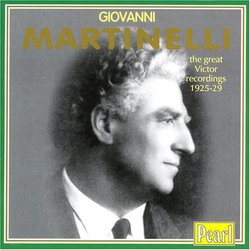| All Artists: Giuseppe de Luca, Giuseppe Verdi, Fromental Halevy, Camille Saint-Saens, Umberto Giordano, Ruggero Leoncavallo, Giacomo Puccini, Pietro Mascagni, Jules Granier, Frederick H. Martens, Ernesto de Curtis, Anonymous, Frederic Blanc, E.A. Mario, Giulio Setti, Josef A. Pasternack, Grace Anthony, Rosa Ponselle, Giovanni Martinelli Title: Giovanni Martinelli Recordings 1925 - 29 Members Wishing: 0 Total Copies: 0 Label: Pearl Release Date: 4/13/1999 Genres: Special Interest, Pop, Classical Styles: Vocal Pop, Opera & Classical Vocal, Sacred & Religious Number of Discs: 2 SwapaCD Credits: 2 UPC: 727031003021 |
Search - Giuseppe de Luca, Giuseppe Verdi, Fromental Halevy :: Giovanni Martinelli Recordings 1925 - 29
 | Giuseppe de Luca, Giuseppe Verdi, Fromental Halevy Giovanni Martinelli Recordings 1925 - 29 Genres: Special Interest, Pop, Classical
|
Larger Image |
CD Details |
CD ReviewsHow Soon We Forget V | Michigan | 12/21/2009 (5 out of 5 stars) "I've never encountered a formally proposed Law of Forgetfulness, but I've several times heard it said that people who don't make into the history books are pretty much forgotten after the passage of three generations. This sentiment is poignantly expressed in the recent movie TROY when Achilles (portrayed by Brad Pitt) is told by his mother Thetis (portrayed by Julie Christie) that unless he distinguishes himself in the Trojan War he won't be remembered by anyone beyond the time of his grandchildren.
There is a cognate phenomenon whereby people more or less over-remember the heroes of their youth. Thus, for anyone who saw Jack Dempsey fight in his prime, Dempsey was the greatest heavyweight champion of them all; and likewise for those who saw Joe Louis fight in his prime, those who saw Mohammed Ali fight in his prime, and those who saw Mike Tyson fight in his prime. The same thing appears to be true when it comes to opera singers. A startling number of people who revere the Three Tenors---Luciano Pavarotti, Placido Domingo, and Jose Carreras---have never heard recordings by any tenor whose career antedated the introduction of the long-playing record. Such persons may be heard offering the opinion that Pavarotti, Franco Corelli, or even Mario Lanza is the greatest tenor who ever lived. Caruso? "Oh, yeah. I think I heard one of his records sometime. I wasn't impressed." Jean DeReszke? Francesco Tamagno? Fernando DeLucia? Giovanni Zenatello? Alessandro Bonci? Leo Slezak? Lucien Muratore? "Never heard of 'em." Giovanni Martinelli? Beniamino Gigli? Giacomo Lauri-Volpi? Aureliano Pertile? Tito Schipa? "Who're they?" Giovanni Martinelli (1885 - 1969) had the kind of tenor voice that vocal specialists classify as a "lirico-spinto", producing a medium-weight but often very powerful tone with a dusky, metallic quality intermediate between the lighter, brighter, more "treble"-sounding light and lyric tenors and the darker, heavier, baritonally-tinged dramatic and robust tenors. Placido Domingo's tenor is a recent example. It's been said that a good lirico-spinto can sing pretty much any operatic role, and history provides plenty of illustrations. Francesco Marconi (1853 - 1916) and Leo Slezak (1873 - 1946), to cite only two, had enormous repertoires embracing such disperate roles as the tenor leads in Mozart's DON GIOVANNI and Verdi's OTELLO. Martinelli (and Domingo too, for that matter) exhibited much the same kind of versatility, although artistically and temperamentally he leaned toward the heroic/declamatory repertoire. Martinelli and Beniamino Gigli (1890 - 1957) were the counterparts of Domingo and Pavarotti during the period 1920 - 1940. They garnered the majority of votes when the question was asked "Who's the greatest tenor in the world?" following the death of Caruso. Both were prolific record-makers, but only Gigli may be heard today in commercially produced recordings of complete operas. Acetate-disc air-check recordings were made when Saturday matinee performances at New York City's Metropolitan Opera House were broadcast live over NBC radio during the years 1934 - 1945, and Martinelli stars in several of these: Bellini's NORMA, Ponchielli's LA GIOCONDA, Leoncavallo's I PAGLIACCI (3 performances), and Verdi's IL TROVATORE, SIMON BOCCANEGRA (2 performances), UN BALLO IN MASCHERA, and OTELLO (5 performances). Martinelli's live recordings of complete operas were never put into general circulation, though, and they're somewhat hard to come by today. His acoustical and early-electric commercial recordings of operatic selections and Neapolitan songs, made between 1912 and 1939, are likewise drifting into obscurity. We may be thankful, then, for PEARL's CD anthology of the tenor's Victor recordings from the mid- to late-1920s when he was in his vocal prime. The PEARL anthology contains many of the choice Martinelli items from the Victor catalog, reproduced more or less "straight" without any electronic amplification or noise-filtering. There've been cleaner transcriptions that offer more presence and more ambient resonance. PEARL's sound isn't painful, but nobody's going to mistake it for hi-fidelity. Nevertheless, several of the selections are considered phonographic classics by vocal historians. Sample Martinelli's 1927 take of "No, Pagliaccio non son!" from Act II, scene ii, of Leoncavallo's I PAGLIACCI. This recording receives lavish praise in John B. Steane's THE GRAND TRADITION (Charles Scribner's Sons, 1974), pp. 588 - 589, and rightly so. There are plenty of other selections that should be ear-openers for newcomers to Martinelli, so the PEARL disc is recommended to anyone capable of savoring the operatic past." |

 Track Listings (12) - Disc #1
Track Listings (12) - Disc #1